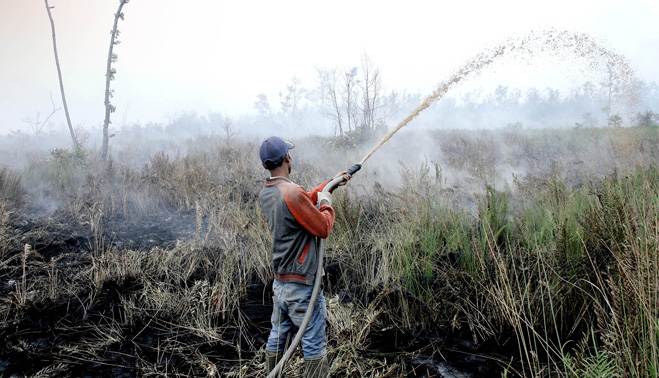![]() Home > World Business
Home > World Business
Palm Oil's Bear Market Won't Help Relieve Singapore's Haze

A worker sprays water in an attempt to contain a wildfire that razes through a peatland field in South Sumatra in October of last year. Photographer: Bagus Kurniawan/AP
![]() July 15th, 2016 | 09:20 AM |
July 15th, 2016 | 09:20 AM | ![]() 1227 views
1227 views
SINGAPORE
Nearly a year after haze from Indonesian forest fires created some of the worst air pollution ever in Singapore, fire season is starting again. The Indonesian government agency in charge of disaster mitigation said via a Twitter post on July 13 that an alert was in effect until Oct. 8 for land and forest fires in Central Kalimantan, on the island of Borneo. On July 14, the same agency said over 1,300 hectares (3,212 acres) were already burning in Riau, on the island of Sumatra.
To be fair, it's too early to break out the facemasks and air purifiers: the Sumatra fires are still small. Moreover, it's unclear whether this year's fires will cause haze as bad as the pollution that darkened Singapore's skies in 2015, when the smog led to school closures and disruptions of air and sea traffic. On Sept. 24, Singapore's air pollution index soared to 316, just shy of the record 321 hit in 2013. The pollution from 2015's fires led to S$700 million ($521 million) in losses, Environment and Water Resources Minister Masagos Zulkifli said in March. The damage in Indonesia was far worse, with the World Bank estimating the country suffered losses of $16.1 billion.
The fires this time could exacerbate tensions between Singapore and Indonesia, where many farmers illegally use slash-and-burn methods to clear land for palm oil plantations. Last month, Indonesian Foreign Ministry Spokesman Arrmanatha Nasir said the country's ambassador in Singapore had submitted a “strong protest” against the city-state's attempts to use a 2014 law against polluters to investigate Indonesian companies.
“We emphasize that laws implemented in Singapore shouldn't harm the beneficial trade cooperation we have in place or harm our businesses,” he said. “The government has communicated our objection to the law.”
Singapore has the right to look into alleged polluters, the country's top environment official told Bloomberg Television in an interview on July 12. “I am sure from the signals that we are getting they are worried,” Masagos said, adding that Singapore would not pursue alleged Indonesian-based polluters without the cooperation of the government there. “We respect the sovereignty of Indonesia,” he said.
With the fires now starting in Indonesia, the environment minister is hoping for the best. “We believe, cautiously, that there will be less haze this year,” Masagos said, “but that will be either because [Indonesian officials] have done a good job or because the weather is on our side.”
This year's fire season comes at a time when palm oil growers are facing tougher times. Prices have plunged 20 percent since March as good weather has contributed to a bumper global crop that will add about 6 million tons to supply, more than twice the usual yearly increase, according to edible oils trader Dorab E. Mistry, director of Godrej International Ltd. in Singapore. Demand isn't likely to grow by more than 4 million tons, he added. “We are bracing for a huge oversupply,” he said. “The market is in a bit of a tailspin.”
Still, the bear market isn't likely to provide any relief for Singaporeans or Indonesians hoping for clear air in the months ahead. Even with the fall in prices, Indonesian palm plantation owners can still make money: their cost of production is about $400 a ton, according to Kelvin Chow, an analyst with Rabobank in Singapore. That's $100 below current market prices. “The farmers will still clear the land and still plant,” he said. “I don't see any decrease in so-called land-clearing.”
Source:
courtesy of BLOOMBERG
by Bruce Einhorn
If you have any stories or news that you would like to share with the global online community, please feel free to share it with us by contacting us directly at [email protected]